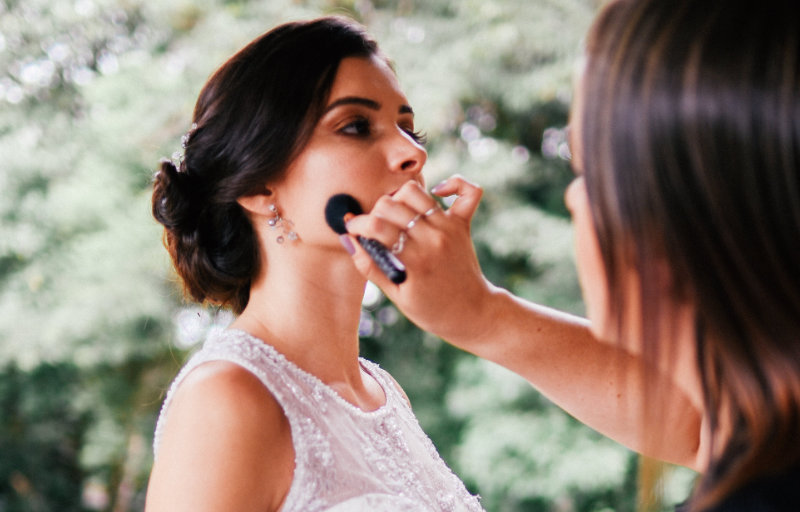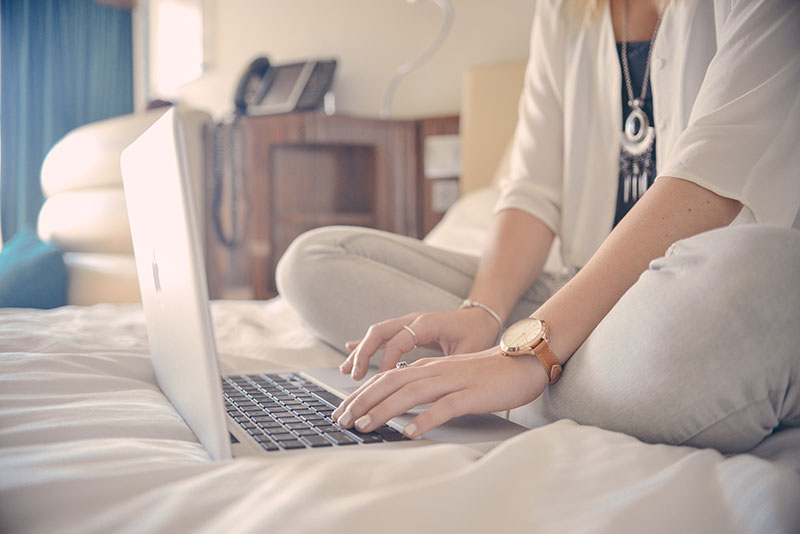How to become a makeup artist
Makeup artists are responsible for creating stunning looks for models, brides and everyday clients. They must be proficient in a wide array of makeup styles, including natural, everyday looks and bold designs. These professionals also need to be skilled in skincare and colour matching, as well as stay updated on the latest makeup trends and products.
What makes a career as a makeup artist (mua) so enjoyable and interesting is the endless potential for self-expression and creativity. The ability to transform a person’s appearance and boost their confidence is incredibly rewarding. So, if you have a passion for beauty and creativity, a career as a makeup artist could be the right choice for you.


Average Salary
£20,500 to £40,000

Qualification Level
Variable

Weekly Hours
38 to 40 hours
What will be my roles and responsibilities if I become a makeup artist in the UK?
Becoming a makeup artist allows you to unleash your artistic talents. It enables you to bring out the best in people. Whether you choose to work in the fashion industry, film and television or as a freelance makeup artist, this profession offers a world of opportunities. However, becoming a makeup artist involves honing your skills, staying current with trends and infusing your artistry into every look you create.
Let’s take a look at some of the daily roles you can expect to fulfil as a makeup artist in the UK:
- Meet with clients to discuss their preferences, desired looks and any specific requirements for events or projects.
- Apply make up to clients, models or actors based on their specific needs and the desired look.
- Evaluate clients’ skin conditions and types to determine the appropriate skincare and makeup products to use.
- Select and blend makeup products to match the client’s skin tone and undertones for a seamless finish.
- Maintain a clean and organised workspace and follow proper hygiene practices to ensure the safety and well-being of clients.
- Stay updated on the latest makeup products, tools and techniques.
- Recommend suitable cosmetics for various purposes and skin types.
- Create unique and visually striking makeup looks.
- Apply setting sprays or powders to ensure makeup lasts throughout the day or during photo shoots.
- Conceal blemishes, scars and imperfections to enhance clients’ natural beauty.
- Handle scheduling, client communication, billing and marketing if working as a freelance makeup artist.
What qualifications do I need to become a make-up artist in the UK?
You don’t necessarily need formal qualifications to become a make-up artist in the UK. However, acquiring the right training and skills is essential for success in this creative and competitive field.
Here are the typical steps individuals take to start a career as a makeup artist:
Take up a university course
Obtaining a foundation degree, a higher national diploma (HND) or a full bachelor’s degree in specialist makeup techniques can be a substantial step towards establishing yourself as a professional makeup artist in the UK. Attending a university and doing a relevant course can provide in-depth training and a strong foundation in makeup artistry. It can prepare you for a career in various sectors of the beauty industry.
Some of the courses you can take include:
- Media makeup artistry
- Makeup for media and performance
When applying for university makeup artist courses, demonstrating creativity and strong communication skills can be beneficial.
The entry requirements usually include:
- 2-3 A levels for a degree
- 1-2 A level for foundation or HND
Take up a college course
Enrolling in a college course in makeup can be an exciting journey for anyone passionate about the art of cosmetics and beauty transformation. These courses provide aspiring makeup artists with the knowledge and hands-on training necessary to excel in the industry.
Some makeup courses you can consider include:
- Level 2 Certificate in Makeup
- T level in Hair Dressing and Beauty Therapy
- Level 3 Diploma in Makeup Artistry
The entry requirements can include:
- Minimum of 2 GCSEs at grades 9-3 for a level 2 course.
- 4-5 GCSEs at grades 9-4 for a T level course.
- 4-5 GCSEs at grades 9-4 for a level 3 course.
Do an apprenticeship
Doing an apprenticeship is an excellent way to gain valuable hands-on experience and practical skills in the field of cosmetics and beauty. Unlike traditional college courses, apprenticeships offer a unique learning experience. It allows you to work alongside experienced makeup artists while earning a wage.
The requirements may include:
- Some GCSEs for intermediate apprenticeship
- Minimum of 5 GCSEs for advanced apprenticeship
- Proficiency in maths and English
Work as an assistant
Starting out as a trainee to an established makeup team is a practical and effective way to kickstart your journey in the world of makeup artistry. Being a trainee offers a valuable learning experience. This role allows you to observe and learn from experienced professionals in real-world settings such as film, theatre or fashion productions.
As a trainee, you can assist with various tasks, including setting the equipment, organising makeup kits and supporting artists during makeup applications. This hands-on involvement enables you to understand the workflow, techniques and demands of the makeup industry.
Finding casual work doing makeup and hair for extras in crowd scenes, especially in film and TV, can provide you with practical experience. Working in a salon or focusing on wedding and event makeup provides you with the opportunity to develop your skills. In addition, working in cosmetic sales also allows you to become familiar with various makeup brands, products and customer preferences.
What skills do I need to become a professional makeup artist?
If you want to become a professional makeup artist, you must have a diverse set of skills. Makeup artists must possess various essential skills to excel in this competitive field.
Let’s take a look at the key skills needed to embark on a successful career in makeup artistry:
- Must be creative and able to come up with different makeup styles and looks.
- Understanding of how different colours work together and how to choose the right shades.
- The ability to pay attention to detail and ensure your makeup looks perfect.
- Have excellent communication skills.
- Must be good at time management.
- The ability to adhere to clean and safe practices to ensure everything is clean and safe when applying make-up.
- Being able to adjust and work well in different situations.
- The ability to provide excellent service and make clients feel good.
- Good understanding of the latest makeup products and how to use them.
- The ability to handle business aspects like pricing and marketing if you are a freelancer.
Average makeup artist salary in the UK
The salary of make-up artists in the UK varies widely depending on factors like experience, location, specialisation and the specific industry they work in.
Those just starting out in the field often earn lower salaries. On average, they may earn around £20,500 per year. With years of experience and expertise, they can earn up to £40,000 per year. Special effect and body art makeup artists often have the opportunity to earn higher salaries due to their specialised skills.
While experience and specialisation play a significant role in determining earning potential, factors such as geographic location, client base and industry connections can also influence a makeup artist’s income. For instance, artists in areas like Liverpool earn up to £17.35 per hour, while artists in areas like Birmingham earn around £10.80 per hour.
Freelance makeup artists often have the flexibility to set their own rates. However, those working in salons and the beauty industry may receive a structured compensation. Make-up artists can increase their income as they gain experience, build their portfolio and establish their reputation in the industry.
Career path and progression of makeup artists in the UK
Many makeup artists start their careers by gaining experience through entry-level roles such as working as assistants and trainees. They may also begin freelancing, offering makeup services to friends, family and acquaintances while building their portfolio.
Some makeup artists work in salons, providing services for clients seeking everyday or special occasion looks. As they accumulate experience, they may work towards more specialised areas such as films, theatrical makeup and television. They can work as makeup artists for actors and performers.
Makeup artists with a passion for fashion choose to collaborate with photographers, models and stylists to create striking and on-trend make-up looks for photo shoots and runway shows. Then, there are those who get into special effects makeup and body art.
Some experienced makeup artists get into roles as educators. They share their knowledge and expertise with aspiring artists. They may teach at beauty schools, colleges or offer private workshops and masterclasses.
Additionally, some can establish their own make-up businesses and offer a wide range of services. As makeup artists build a name for themselves, they might have the chance to work with high-profile clients, including celebrities, musicians and public figures.
Typical working hours of makeup artists
The working hours of makeup artists can vary widely. Artists often experience flexible schedules that adapt to the demands of their clients, projects and employers.
Freelance makeup artists often enjoy flexible working hours as they can set their schedules according to their availability and needs of their clients. These artists may have irregular working hours, with weekends and evenings being common to cater to clients for special events like weddings, parties and photoshoots.
Makeup artists working in salons or the beauty industry typically adhere to regular working hours. They may work 38-40 hours per week, including weekdays and weekends. Those in the film and television industry may have varied schedules that depend on production needs. Artists in the fashion and editorial industry may also have flexible schedules. The working hours of special effects and body art makeup artists may be irregular.
Working environment of artists in the makeup industry
Makeup artists have the opportunity to work in a wide range of settings based on their specialisation and client needs.
Those who work in salons have a comfortable workspace. They work in an environment with dedicated makeup stations and the necessary tools and products. It is a setting where they offer services like bridal makeup, special events, and everyday make-up to clients.
Those who work in the film and television industry often find themselves on sets. Their settings can vary from indoor studios to outdoor locations. Makeup artists who prepare actors for stage performances work in backstage makeup rooms or dressing areas equipped with mirrors and workstations for makeup application. The same is true for artists working in the fashion industry. Freelance makeup artists offer services to clients at various locations, such as their homes or event venues.
What type of insurance do I need to work as a professional make-up artist in the UK?
Public liability insurance is a crucial aspect of operating as a makeup artist in the UK. It provides financial protection in case of unexpected events and accidents that may occur while you are working with clients.
Public liability insurance safeguards you if a client or a third party sustains injuries or experiences property damage during a makeup application. Accidents, such as a client tripping over your equipment or reacting to a makeup product, can happen. This insurance covers legal expenses and compensation in such situations.
Having insurance also demonstrates your professionalism and commitment to your client’s well-being. It can make clients feel more secure when working with you. Additionally, some venues require makeup artists to have public liability insurance to protect their property and visitors.




